.png) |
| |
| INDIA-TAIWAN ECONOMIC TIES: IS RIGHT NOW THE RIGHT TIME? |
|
Dr. Mumin Chen, Mr. Santosh Pai, Dr. Joe Thomas Karackattu
Wednesday Seminar | Zoom Webinar |3 March 2021
|
| |
|
Optimism surrounding a possible upgrade for the India-Taiwan relationship can be said to have peaked in 2020 against the backdrop of India-China border tensions. Although the potential to develop numerous facets of this relationship has been acknowledged for several years, crucial breakthroughs remain elusive. Trade volumes which were rising from a small base have dipped. Although Taiwanese investments in India are growing, they are nowhere near the investment flows into much smaller countries in the ASEAN region. Priorities articulated in India's National Electronics Policy 2019 clearly match strengths of the Taiwanese ICT industry but only contract manufacturers which assemble products for multinationals have responded to "Make in India" so far.
. |
| Read> |
|
|
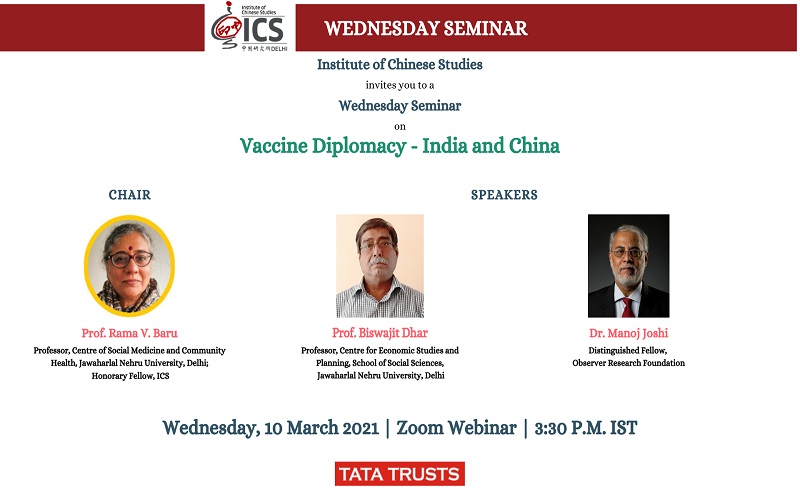 |
| |
| VACCINE DIPLOMACY - INDIA AND CHINA |
|
Biswajit Dhar, Manoj Joshi
Wednesday Seminar | Zoom Webinar |10 March 2021
|
| |
|
However, access to affordable vaccines has emerged as a major challenge for two reasons. First, several developed countries have stocked vaccines well in excess of their requirements, thus indulging in a practice that can best be described as "vaccine nationalism". Secondly, even in the midst of one of the worst pandemics affecting the humankind, several companies are exercising their market power, by leveraging, among others, their intellectual property rights (IPRs) over the vaccines. Vaccine diplomacy is also the flavour of the day. Even as developed countries flounder in dealing with COVID 19, countries like China and India, who have seemingly handled the situation better, have stepped in to fill the breach. They are going out of their way to provide developing countries the COVID vaccine, often on a grant basis and building up a stock of diplomatic goodwill.
|
| Listen> |
|
|
.png) |
| |
| WIRELESS VULNERABILITY: INDIA'S DEPENDENCY ON CHINESE TELECOM |
|
Smita Purushottam,Rajiv Mahajan, Charulatha V,Parag Naik
Wednesday Seminar | Zoom Webinar |17 March 2021
|
| |
|
The China-Pakistan Economic Corridor (CPEC) has been earmarked as a flagship project of the Belt and Road Initiative (BRI), which is described as Chinese President Xi Jinping's signature foreign policy initiative and a grand strategy aimed at restoring China's "rightful'' great-power status in the world. It is a major plank in China's geo-strategic and economic architecture for the region, using Pakistan to secure an exploitative strategic perch in South Asia and the Arabian Sea, overlooking the crucial Persian Gulf, the west coast of India, and the east coast of Africa. Pakistan's economic distress, friction between Islamabad and Washington in recent years, and, its enduring tensions with India, provide Beijing an opportunity to draw Pakistan even closer into its strategic orbit.
|
| Watch> |
|
| |
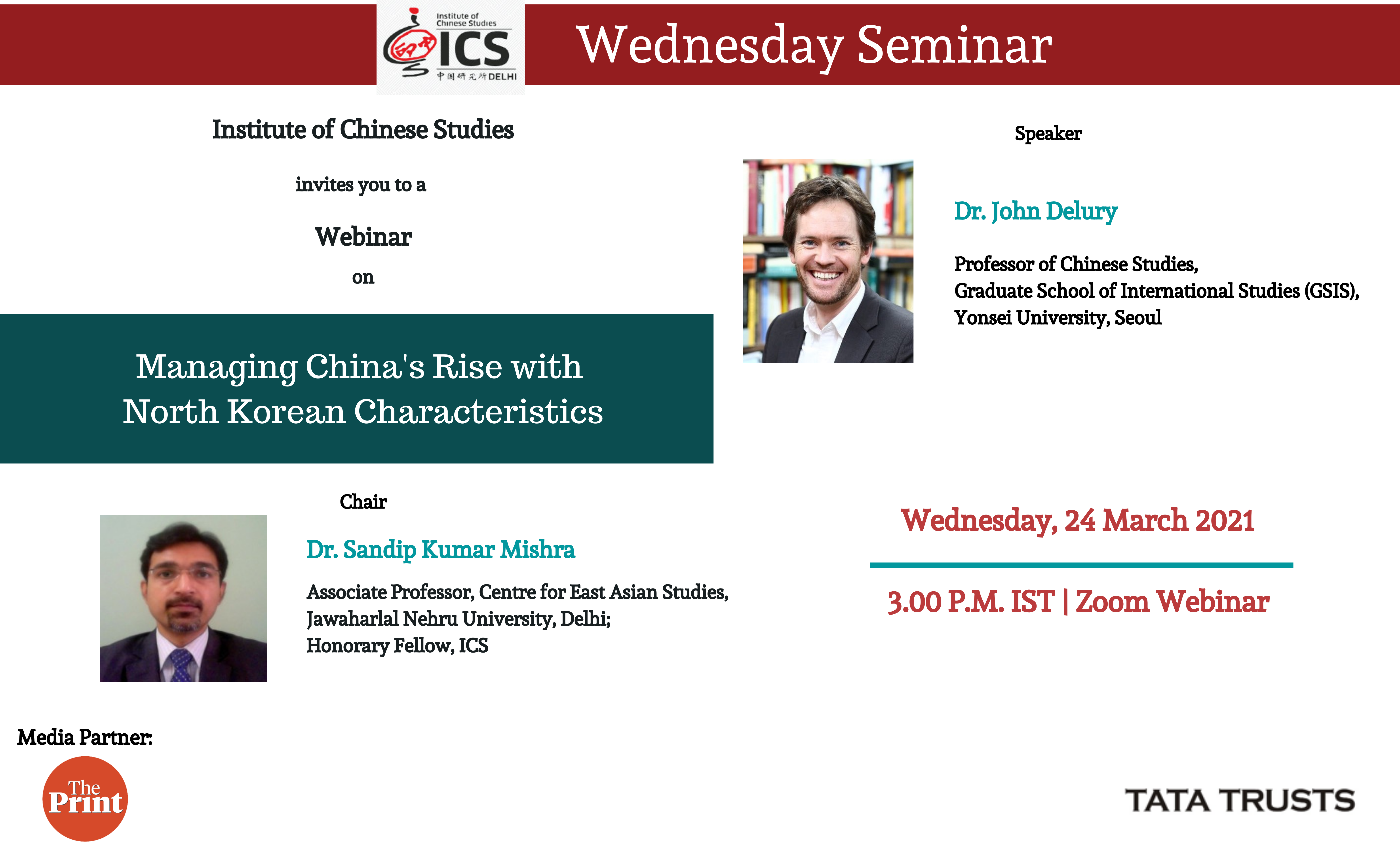 |
| |
| MANAGING CHINA'S RISE WITH NORTH KOREAN CHARACTERISTICS |
|
John Delury
Wednesday Seminar | Zoom Webinar |24 March 2021
|
| |
|
As all of Asia and the "Indo-Pacific" grapple with the challenges of managing China's rise, one country, the Democratic People's Republic of Korea (DPRK), does so from a position of unique strength and weakness. On the one hand, North Korea can boast of being the PRC's sole defense treaty ally as well as brotherly communist party-controlled state. The two countries share a long border and China has emerged as North Korea's dominant trade and investment partner. Yet these very features create a strategic trap for Pyongyang, which can easily lose autonomy given its hostile relations with the US and its allies and distant ties to more neutralist nations. While most analysis focuses on Kim Jong Un's nuclear capabilities, this lecture explored North Korea's thinking about how to deal with its hegemonic patron, and what implications their complex bilateral relationship might have on the round of diplomacy about to commence with the new Joe Biden administration and final year of the Moon Jae-in government.
|
| Watch> |
|
|
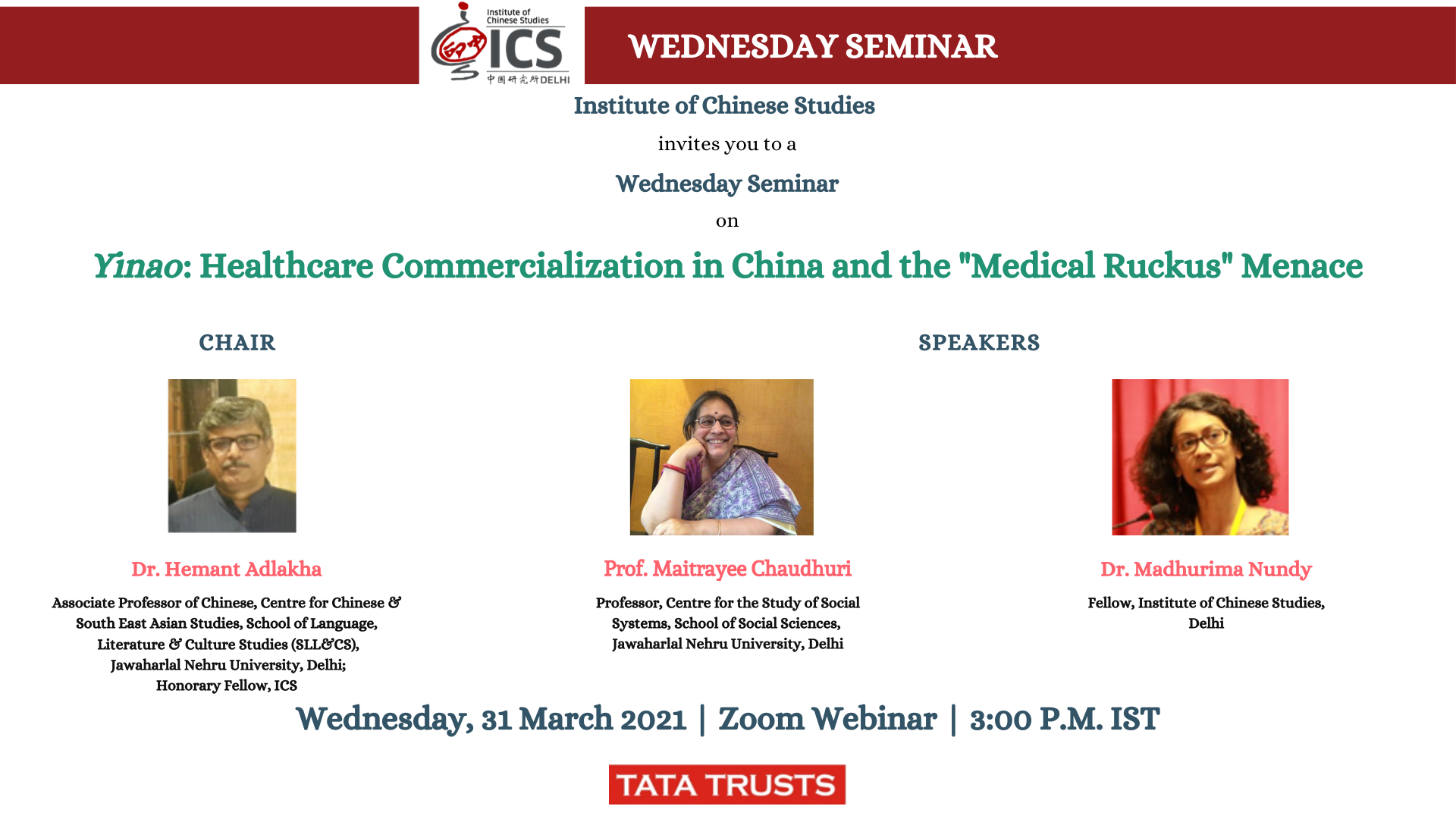 |
| |
| YINAO: HEALTHCARE COMMERCIALIZATION IN CHINA AND THE "MEDICAL RUCKUS" MENACE |
|
Maitrayee Chaudhuri, Madhurima Nundy
Wednesday Seminar | Zoom Webinar |31 March 2021
|
| |
|
Yinao – healthcare disturbance or "medical ruckus," refers to violent incidents directed against healthcare practitioners – especially large hospital's doctors and nursing staff – and facilities for financial benefit in China. Yinao social phenomenon has been widespread and increasing, and is a typical product of commercialization of healthcare since the implementation of economic reform policy in 1979-80. China's national CCTV reported that in 2010 alone there were 17,243 medical disputes, an increase of almost 7000 cases from 2005, while major disturbances involving physical aggression doubled from 9831 in 2006 to 17,243 in 2010. Since 2012, on average over 12,000 health professionals have been attacked every year, and over 25% of China's nursing staff has been reporting having experienced Yinao per year. Yinao, sannong wenti, liudong renkou etc.
|
| Watch> |
|
|
|
| |
|
 |
.png) |
| CHINA REPORT |
| Volume 57 | Issue 1 | February 2021 |
| |
| Read more >> |
|
|
 |
| ICS ANALYSIS PAPER |
| |
China and Denuclearization of North Korea
|
| Sudarshan Gupta | Issue No. 131 | March 2021 |
| |
| The outbreak of coronavirus has shaken the world with more than 1,443,804 deaths and millions of infected patients. |
| Read more >> |
|
|
 |
| ICS Occasional Paper |
| |
Reigning in the Brahmaputra: Challenges to and Opportunities of Inter-Basin Cooperation
|
| Shivi Sanyam, Rahul Suryavanshi, Yash Johri |Issue No. 68 | March 2021 |
| |
| Artificial Intelligence (AI), an emerging dual-use technology, which holds the potential to change the nature of warfare, has the profound capability of reshaping the ongoing great power rivalry. From diplomatic engagements to traditional methods of warfare, AI may be leveraged to change the nature of warfare as well as redefine the concepts of strategic stability, deterrence, and balance of power. |
| Read more >> |
|
|
.png) |
| ICS Working Paper |
| |
Chinese and Indian Economies since the 2008 Financial Crisis
|
| Manmohan Agarwal | March 2021 |
| |
| With the Indo-Pacific becoming the new arena of the great powers’ power projection, India’s role as a chief actor in the region has also become increasingly significant. India’s unique strategic location and its increasing influence in international politics make it a significant player in the region, making India’s position a determining factor in the formulation of various countries’ foreign policies, such as the United States of America, Australia, and Japan. |
| Read more >> |
|
|
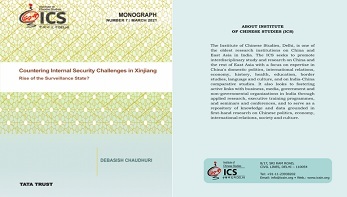 |
| ICS Monograph |
| |
Countering Internal Security Challenges in Xinjiang
|
| Debasish Chaudhuri| March 2021 |
| |
| Someone once asked: “If Gandhi, and not Mao Zedong, was born in China, what would it be like?” In fact, the answer is simple – look at India today! That is, the lower class lacks the spirit of resistance, so they have all along remained oppressed, forming a strong class division in society, and resulting in extremely low degree of class mobility. |
| Read more >> |
|
|
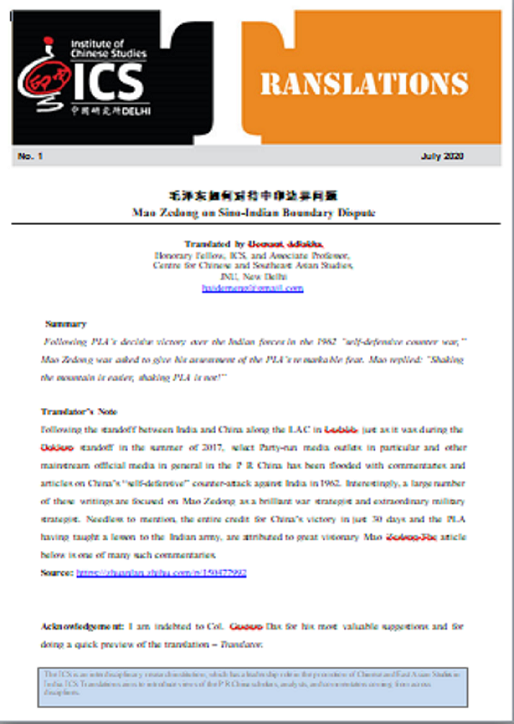 |
| ICS TRANSLATIONS |
| |
Xiang Jingyu: The Only Woman among the CPC Founding Members
|
| Hemant Adlakha| Issue No:27 | March 2021 |
| |
| Xiang Jingyu (1895-1928), one of the earliest members of the Communist Party of China, was born on 4 September, 1895 in Xupu county, Huaihua district in Hunan province. |
| Read more >> |
|
|
| |
| |
|
 |
| ICS TRANSLATIONS |
| |
Wedding Gift New Regulations 2021: Is it really true caili* is gone? Is demanding ‘bride price’ now against the law?
|
| Hemant Adlakha| Issue No:28 | March 2021 |
| |
| Caili (pronounced tsai lee) or “Bride price” in English has been described as one of China’s most critical social issues facing the central authorities in recent times. |
|
Read more >>
|
| |
|
 |
| ICS TRANSLATIONS |
| |
Illegal and Viewed as Unethical, China’s Surrogacy Debate is Caught between Blood Affinity and Parenting
|
| Snigdha Konar | Issue No:29 | March 2021 |
| |
| Xiang Jingyu (1895-1928), one of the earliest members of the Communist Party of China, was born on 4 September, 1895 in Xupu county, Huaihua district in Hunan province. |
| Read more >> |
|
|
| |
|
|
|
| ICS BLOGS |
| |
| The ICS Blog is a platform for an open dialogue that aims to inform and enlighten, especially young scholars and analysts on contemporary issues related to China and East Asia. |
| |
| Two Sessions: NPC & CPPCC Ignore Demand to End Xìngbié qíshì |
| |
| Pritish Gupta |
| March 2021 |
|
|
| Year of the Ox Brings Cheers for China’s Diplomacy: PRC Scholar |
| |
| HEMANT ADLAKHA |
| March 2021 |
|
| North Korea's growing economic dependence on china |
| |
| PRITISH GUPTA |
| March 2021 |
|
|

|
|





